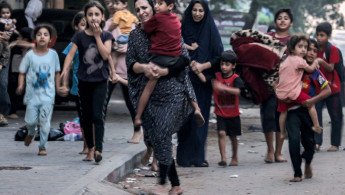Israel detains 142 Palestinian women and girls in Gaza invasion
Israel has detained 142 Palestinian girls and women, including babies and elderly women, during its ground incursions into Gaza since 7 October, the Commission of Detainees and Ex-Detainees Affairs and the Palestinian Prisoners’ Club have said.
A joint statement issued by the two organisations on Sunday evening says that the Palestinian female detainees are being held in various Israeli prisons, including Damon and Hasharon prisons.
The two groups, which focus on Palestinian prisoners, have previously highlighted the abuse and mistreatment of Palestinian detainees in Israeli prisons.
They said that Israeli authorities had refused to disclose information about the detainees from Gaza, such as their numbers, detention locations, and health conditions.
'There are heightened concerns regarding the fate of the prisoners in light of the shocking and horrifying images and testimonies emerging from citizens recently arrested in Gaza.
"We do not rule out the possibility of the occupation carrying out field executions against detainees from Gaza," the statement added, referring to footage of Palestinian men in Gaza being stripped and bound by Israeli troops."
The Israeli prison administration announced at the end of November that there were 260 detainees from Gaza classified as "unlawful combatants."
The Palestinian Prisoners' Club says that Israel has detained at least 3,730 Palestinians since 7 October.
Prior to the onset of the current war, as of June 2023, the number of Palestinian detainees in Israeli prisons was around 4,000.
Israel’s devastating war on Gaza has killed more than 18,000 people, mostly women and children, and left at least 49,600 critically injured.
It has also caused unprecedented destruction and "shocking living conditions", according to local and international NGOs and eyewitnesses.





 Follow the Middle East's top stories in English at The New Arab on Google News
Follow the Middle East's top stories in English at The New Arab on Google News


